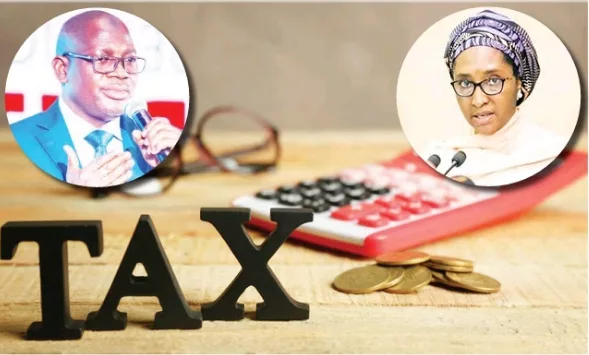As the federal government envisages raising taxes on Nigerians, baring the country’s acute cash crunch that has been accumulating over the decades, economists and industrialists have cautioned that the move will have broad untoward effects on the Nigerian economy.
According to the literature, taxation on goods, income or wealth influence economic behaviour and the distribution of resources.
Higher income tax can enable a redistribution of income within society, but may have an impact on reducing the incentives to work and supply labour.
Taxation can have an impact on many aspects of the economy, including labour supply, labour productivity, economic growth, inflation, production and consumption of goods, saving rates/consumption, income distribution, resource distribution, and levels of government spending.
The main purpose of tax is to raise income for the government which can lead to higher spending on health care and education. The impact depends on what the government spends the money on.
Higher income tax reduces take-home pay and can reduce the incentive to work. Either workers chose not to do overtime or even leave the labour market altogether. However, there are two conflicting effects of higher tax.
Higher tax leads to lower wages – and work becomes relatively less attractive than leisure. The substitution effect of a higher tax is that workers will want to work less.
However, if higher tax leads to lower wages, then a worker may feel the need to work longer hours to maintain his target level of income. Therefore, the income effect means that higher tax may mean some workers feel the need to work longer.
This means there is no guarantee of the impact of higher tax – it depends whether the substitution effect is greater than the income effect.
The Laffer curve is an analysis which suggests at some tax rates, higher income tax will reduce incentives to work and actually leads to lower tax revenue.
Reacting to the new fiscal policy proposal, the chief executive of the Center for the Promotion of Private Enterprise, and former director-general of the Lagos Chamber of Commerce and Industry, Dr. Muda Yusuf, in a statement, released to NATIONAL ECONOMY, said some tax and import duty provisions in the 2023 Fiscal Policy Measures of the federal government would significantly hurt the economy and worsen the de-industrialsation worries in the Nigerian economy. He said the construction and transportation sectors are also vulnerable to fiscal policy induced downside risks.
According to him, “Some of the measures could exacerbate inflationary pressures which are detrimental to economic growth and manufacturing, construction and transportation sectors. It is double whammy for economic players to contend with a regime of high import duty, prohibitive tax rates amid a depreciating currency.
“Fiscal policy measures must seek to ensure a good balance between objectives of revenue generation, boosting domestic production, enhancing the welfare of citizens, promoting economic growth, deepening economic inclusion, facilitating job creation and recognising societal ethos, beliefs and values.”
He cited specific reviews of the new fiscal policies are as follows: excise duty on beverage, drinks, and wines.
The fiscal policy measures imposed the following rates: Non-Alcoholic Beverages, Fruit Juice, Energy Drink Excise: Duty of N10 per liter; Beer and Stout: 20 per cent Ad valorem Tax; N75/Litre ; Wine Production: 30 per cent Ad Valorem; N75/Litre; Spirit and other Alcoholic Beverages: 30 per cent Ad Valorem; N150/litre.
He noted that Ad valorem tax is based on the value of the product, which makes the impact even more injurious to industrialists.
He stated that sustaining current investments in these sectors would be a herculean task. These policy measures failed to reckon with the multifarious challenges which industry operators are currently grappling with, some of which include: weak and declining consumer purchasing power, naira exchange rate depreciation which is taking a huge toll on cost of production, high energy cost, multiple taxes and levies already being imposed on the industry players, risk to jobs in the sector and its extended value chain including millions of MSMEs in its distribution and marketing chain, and downside risk to manufacturing sector outlook in the Nigerian economy.
He added that the implications of such a move would be, drop in sales for investors in the sector, negative effect on tax revenue from the sector, loss of direct and indirect jobs which could be in a couple of millions, millions of farmers supply local inputs such as grains to the sector may lose their livelihoods, risk of decline in profitability and shareholder value, and elevated risk of smuggling of the products.
On 40 per cent import duty on vehicles, Yusuf said, It is difficult to justify this high import duty on vehicles for the following reasons: Nigeria is about 90 per cent dependent on road transportation, which underscores the importance of motor vehicles in the economy; there is an increasing affordability problem for citizens with regard to vehicle acquisition, especially by the middle class of the Nigerian society; cost of locally assembled vehicles are beyond the reach of most Nigerians, contrary to the assurance given by government at the inception of the auto policy; there is limited access to credit for vehicle purchase by Nigerians.
Over 90 per cent of purchases are done out of pocket, which is extremely challenging. And where the credit facilities exist, the interest rates are outrageous, between 25-30 per cent.
“The economy has experienced huge exchange rate depreciation which had already exacerbated vehicle acquisition cost in the first place,” he said.
“It is therefore insensitive of policy makers to impose a whopping 40 per cent import duty on vehicles in an economy where there is no mass transit system and where vehicle ownership has become a necessity, especially for the middle class.
“There is an additional 2 per cent and 4 per cent green tax, depending on the engine capacity of the vehicle. This translates to import duty of 42 per cent or 44 per cent depending on the engine capacity of the vehicle,” he said.
Enumerating the likely implications on Nigerians, Yusuf said it will engender high transportation cost as vehicles costs increase; risk of increased vehicle smuggling, especially in the light of porous borders; the number of rickety vehicles, especially commercial buses will remain high as replacement cost becomes prohibitive; and the middleclass will continue to contend with affordability problems.
Also commenting on a proposed 45 per cent duty on iron and steel products, he said the country is currently contending with high cost of construction of both public and private properties.
“Infrastructure costs have also become very exorbitant. Housing deficit is still very high. It is therefore difficult to justify this high import duty on a major input of construction industry. Some of the implications of the high tariff on iron and steel include the following: increase in cost of housing construction; increase in the cost of infrastructure projects; high and increasing risk of building collapse because of the prohibitive cost of construction materials; high risk of smuggling of iron and steel products; high risk of false declarations and collusion with governed operatives at the ports; and the high tariff is detrimental to the construction industry,” Yusuf stated.
On the tax on domestic wine producers, he said the local wine industry is already under tremendous from imported wines, which are largely smuggled. He said with a 30 per cent Ad Valorem tax and a specific tax of N75/litre, most wine industries operating in the country may have to shut down. He said it is ironic that rather than support local wine producers to be more competitive and create more jobs, the government has opted to impose even higher taxes on them.
“The immediate risk is that the domestic wine market would be taken over by imported and mostly smuggled wine. Ultimately, the Nigerian economy, domestic investors in the sector and the employees of these firms would be the victims of this policy. The government would also suffer revenue losses because smugglers do not pay tax as they operate in the underground economy. The story of producers of spirits and alcoholic beverages is not different from that of the domestic wine producers.
On the tobacco industry, he said tax on tobacco industry was reviewed. New tax is 30 per cent Ad Valorem; N8.20k per stick. There are two main issues with the tobacco sub sector which pose a policy dilemma.
“There is the morality of tobacco production, and there is the economics of it. There is consensus that smoking is dangerous to health. In recognition of this, companies producing it are already mandated to inscribe this on their product packages. Advertisement of tobacco products is already outlawed in Nigeria. And smoking in public places is prohibited by law. There are many other stringent restrictions, including a subtle stigmatisation of smokers. But strangely, all of these have failed to deter smokers, not just in Nigeria, but across the world. It is an addiction issue. It is therefore in order to continue to take steps to discourage smoking.
“However, we should avoid extreme measures that may put the industry at the risk of extermination for the following reasons: there is the risk that the cigarette market would be completely taken over by smuggled tobacco products, which are completely outside the radar of regulatory and revenue authorities. A large underground cigarette economy would be inadvertently created which would be more damaging to the health of citizens and the economy. We need to reckon with the reality of our porous borders. There will be loss of thousands of direct and indirect jobs being currently generated by the domestic tobacco industry. There will be a heightened risk of abuse of alternative drugs which may be more damaging than tobacco.
“Meanwhile, we need to reiterate that this position is not anyway an endorsement of cigarette smoking; it is a risk management proposition while the campaign against smoking is sustained. The truth is that tobacco products produced in the country is a lesser evil than the ones smuggled into the country which are completely outside any regulatory oversight.”
Also speaking on the proposed tax increase, a tax officer, who pled anonymity, said the government would have fewer problems with revenue collection if all the taxes were going into the coffers of the state and federal governments. He said there is a lot of tax out of the control of the government that needs to be brought under its control.
Chief economist at PricewaterhouseCooper (PwC), Dr. Andrew Nevin, said there are 65 different taxes collected in Nigeria.
An economist and social affairs analyst, Dr. Ignatius Ibe, said any further taxation on working class Nigerians and corporations will be too much to bear and may begin to have a boomeranging effect on the larger economy. Noting that inflation is a type of tax, and currently at 223 per cent, Ibe said any further taxation on the labour force and corporations will amount to ‘the last straw that broke the camel’s back’.
He urged the government to tax the rich and their luxury goods more. “How much are the billionaires paying as taxes for their private jets?” he asked.
An industrialist, Isa Yusufu, commenting on the proposed 40 per cent increase on import duty on cars, said the proposal smacks of insensitivity on the part of the government, stressing that the policymakers seem not to be in tune with the reality of the value of the local currency. He urged that the government compares and contrasts how long a civil servant would work to be able to buy a used car of N5 million.





